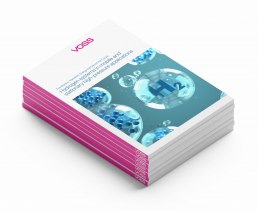A wide variety of industrial sectors have already recognized the value of hydrogen, and there is good reason why it is seen as the fuel of the future. With the growing interest, many companies are increasingly using the green energy carrier in their systems and new concepts and ideas for its use are continuously emerging. In this blog, we take a closer look at one of the most important areas of application for hydrogen: the automotive industry.
Anyone who deals with the topic of hydrogen quickly realizes the great variety of possible applications. More and more industries are exploiting the enormous potential and building on the current state of the art. The automotive industry in particular is looking for new drive options that can offer an environmentally friendly alternative to conventional combustion engines. While many immediately think of electric or hybrid cars when the topic of alternative drives for the automotive industry comes to mind, the use of sustainable energy opens up numerous other possibilities.
After all, commercial vehicles such as tractors, trucks, mobile machinery and industrial trucks also need to find a long-term solution with alternative drives - and this is where hydrogen comes into play. It can be processed into synthetic fuels for use in internal combustion engines. The challenge in this application is the high range required for heavily loaded vehicles. Since conventional electrical systems cannot meet the high energy consumption, hydrogen is the most future-proof energy carrier in this field.
One prime example of sophisticated drive concepts are the hybrid systems from AE Driven Solutions. Their clever concept combines the ambient fuel cell with a battery to provide a CO2-neutral drive with a range of up to 400 km. The system has a total of three operating points: Full load, Standby and Off. Consequently, it only needs to be optimized for a single operating point, which helps it save a large amount of compression energy. In addition, the amount of energy available from the fuel cell system depends primarily on the capacity of the tank. This means that vehicles with mobile refrigeration units can also be operated electrically. With a pure battery drive, on the other hand, the transport of perishable goods such as food or medicine is not feasible.
Leak-free hydrogen transport
In order to put the theoretical advantages of hydrogen into practice, high-density connection solutions are required. This is because hydrogen is the smallest molecule and accordingly sensitive to transport - especially in the high-pressure range. Since everything at VOSS Fluid revolves around future-proof applications, we naturally have a solution for this as well. Our approach is called VOSS Lok 40: A tube forming system in which the fitter uses a forming machine to form a sealing and retaining contour on the tube end. Combined with a matching valve system, VOSS Lok 40 plays to its strengths even further to create a high-density connection in hydrogen- and gas-based propulsion systems.
VOSS joined forces with HypTec GmbH in 2022 for this purpose. The company's high-pressure valve components are suitable for hydrogen applications and fluid gas transport. HypTec's long experience and high level of expertise in the field of valve technology help in designing the sophisticated components. In combination with VOSS Lok 40, this forms a leak-free overall system for the transport and storage of hydrogen in the high-pressure sector of up to 700 bar.
Would you like to find out what else hydrogen can do?
In our free whitepaper „The World in Transition: Energy Carriers of the Future. Hydrogen systems in mobile and stationary high-pressure applications“, we go into detail about the wide range of possible applications in the high-pressure sector and clarify general questions about hydrogen.
